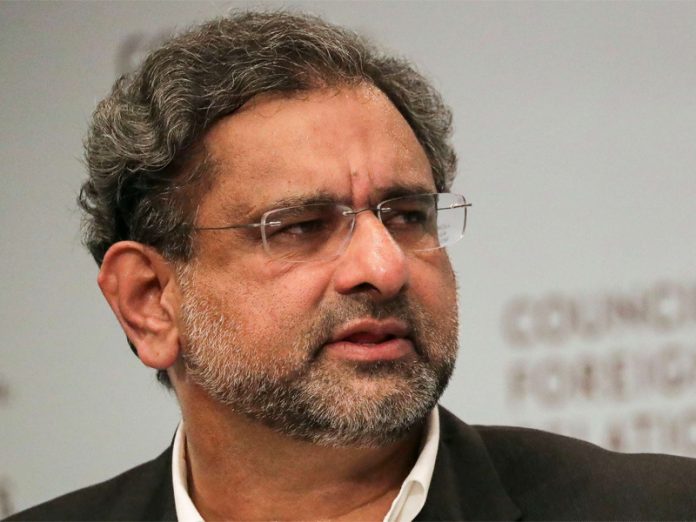ISLAMABAD: In a surprising turn of events that may dent the PML-N, former prime minister Shahid Khaqqan Abbasi has resigned from his position on the Economic Coordination Committee (ECC) of the federal cabinet.
Well placed sources privy to the happenings at the ECC have informed Profit that Mr Abbasi resigned after developing differences with Dr Musadik Malik over the recently announced Azerbaijan LNG Deal.
No official clarification has come from Mr Abbasi whose phone remained off after the news started making the rounds that he had resigned from the ECC. Other members of the PML-N and the government also maintained a tactful silence or ignored questions regarding the matter. Profit reached out to Maryam Aurangzeb, Dr Musadiq Malik, Khurram Dastagir, and a number of other sources including Mr Abbasi himself but to no avail.
Political background
The decision comes merely a day after Abbasi was passed over for any party office at a convention of the PML-N which elected prime minister Shehbaz Sharif as the party’s President and elected Maryam Nawaz as its Senior Vice President — the post Abbasi formerly held within the party.
The resignation is part of a process that has been dragging on for months in which Mr Abbasi has slowly distanced himself from the party that took him to the highest office in the land. A career politician whose father had also been a Nawaz loyalist, Mr Abbasi has been estranged from the PML-N for the entirety of the time that the PDM government has been in power. He first launched the Reimagining Pakistan platform along with Miftah Ismail that many thought would be turned into a political party. He was also a vocal critic of the government’s wheat scheme, alleging corruption in it on a grand scale.
The LNG tussle
As things stand now, Profit’s sources have cited that the former prime minister has resigned over differences with Musadiq Malik. It is worth mentioning that Abbasi held the petroleum portfolio in the Nawaz Sharif administration of 2013-18 and is known as the architect of Pakistan’s switch to LNG.
The sources claimed that Mr Abbasi advocated for a private company to procure LNG from Azerbaijan’s SOCAR, rather than signing a government-to-government agreement during the course of ECC meeting held on 5th June 2023 where petroleum division tabled a summary titled ‘Approval of Framework Agreement between PLL and SOCAR’. A heated debate reportedly ensued between Dr. Musadik Malik and Abbasi during the ECC meeting held on June 5, 2023, regarding the signing of the LNG procurement agreement between Pakistan LNG Limited (PLL) and SOCAR, which ultimately resulted in a stalemate.
Despite the lack of consensus during the initial meeting, the Petroleum Division, responsible for the deal, resubmitted the summary on June 14, 2023. However, Abbasi’s recommendations were not incorporated in the revised version of the summary under which petroleum division sought ‘Approval of Framework Agreement between PLL and SOCAR’. And, the ECC subsequently granted approval to Pakistan LNG Limited (PLL) to proceed with the proposed framework agreement with SOCAR.
Despite the lack of consensus during the initial meeting, the Petroleum Division, responsible for the deal, resubmitted the summary on June 14, 2023. However, Abbasi’s recommendations were not incorporated in the revised version of the summary under which petroleum division sought ‘Approval of Framework Agreement between PLL and SOCAR’. And, the ECC subsequently granted approval to Pakistan LNG Limited (PLL) to proceed with the proposed framework agreement with SOCAR.
The ECC’s decision, which bypassed Abbasi’s suggestions, prompted the former prime minister to tender his resignation from the ECC, sources revealed. Abbasi deemed the ECC’s approval of PLL’s agreement with SOCAR as contradictory to his vision and beliefs regarding the LNG deal.
It is worth noting that this resignation from a key committee holds significant implications within the political landscape, given Abbasi’s stature as a senior leader of the Pakistan Muslim League-Nawaz (PML-N).
Sources close to the matter stressed that the ECC’s decision was made with the intent of safeguarding the country’s interests. They further revealed that the ECC’s approval of the PLL-SOCAR agreement was driven by a belief that it aligns with the nation’s energy needs and contributes to addressing the ongoing energy crisis.
While both Shahid Khaqqan Abbasi and Dr. Musadik Malik have been approached for comments on the matter, they have opted to remain silent, leaving their respective stances undisclosed. Despite attempts to secure their perspectives, the reasons behind the differences between Abbasi and Malik remain shrouded in uncertainty.
The repercussions of Abbasi’s resignation from the ECC are expected to ripple through the political landscape, potentially leading to further debates and discussions regarding the LNG deal with Azerbaijan. As the ECC’s decision stands, PLL is authorised to proceed with the execution of the proposed framework agreement with SOCAR, solidifying a government-to-government collaboration in the LNG sector.
The future ramifications of this development on both Pakistan’s energy sector and the political dynamics surrounding LNG agreements remain to be seen. However, it is evident that Shahid Khaqqan Abbasi’s resignation from the ECC has introduced a new chapter in the ongoing discussions and negotiations surrounding the country’s energy policies.





he was not even member of ECC!